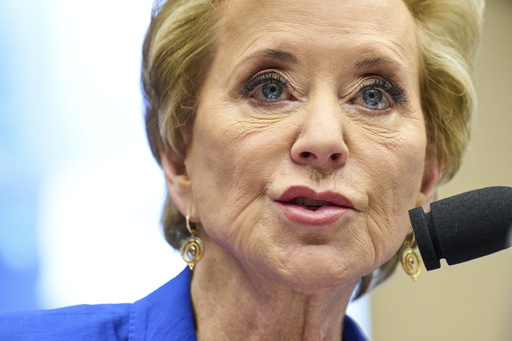In a recent announcement from the University of Pennsylvania, three record-breaking performances by transgender swimmer Lia Thomas have been altered, and the institution has decided to extend apologies to female athletes who were “disadvantaged” due to her participation in women’s swimming events. This decision was part of the resolution of a federal civil rights case, spurred by concerns about fairness in women’s sports. The U.S. Education Department, in collaboration with Penn, revealed this voluntary agreement, which centered around Thomas, who made headlines in 2022 as the first openly transgender athlete to win an NCAA Division I title.
The investigation into the University of Pennsylvania was instigated during the Trump administration, which targeted the participation of transgender athletes in girls’ and women’s sports. It concluded that Penn was in violation of the rights of female athletes by allowing Thomas to compete in women’s swimming events.
As per the new agreement, Penn will restore all lost Division I records and titles to female athletes who were outperformed by Thomas. Furthermore, the institution will issue personalized apology letters to the affected swimmers. By Tuesday afternoon, the university’s website had been updated to display other athletes as holding the top times in the events previously dominated by Thomas. Notably, the site included an annotation stating that Thomas had set the records while competing under the eligibility rules then in effect.
President of Penn, J. Larry Jameson, acknowledged that while the university adhered to NCAA’s eligibility rules during the 2021-2022 swim season, it recognizes that some athletes experienced disadvantages because of those rules. Penn will issue apologies to athletes who felt they faced a competitive disadvantage or were distressed by these policies.
The settlement also requires Penn to commit to a policy where “males” will not compete in female sports categories and to adopt a “biology-based” understanding of male and female categories. Jameson accentuated that the university has always been in line with NCAA and Title IX regulations and does not have specific policies regarding transgender athlete participation. He noted that compliance with federal requirements and adapting to changing NCAA eligibility rules are necessary for their teams and athletes to participate in competitive sports.
Education Secretary Linda McMahon described this resolution as a victory for women and girls, expressing the department’s dedication to upholding Title IX to its full extent and rectifying past missteps regarding female athletes.
Riley Gaines, a former University of Kentucky swimmer, expressed her reaction to the settlement on social media and credited former President Donald Trump, citing her initial resolve to oppose transgender athletes in women’s sports following her own experiences with Thomas during the 2022 NCAA championships.
The U.S. Education Department’s investigation, initiated in February and concluded in April, determined Penn had breached the 1972 Title IX regulation, which prohibits sex discrimination in education. Historically, findings like this have been settled through cooperative agreements rather than legal battles, which could otherwise risk the institution’s federal funding.
Earlier this year, the Education Department prompted the NCAA and the National Federation of State High School Associations to restore any titles, awards, and records contravened by “biological males” competing in female categories, spotlighting the ongoing debate in collegiate athletics, particularly highlighted by Thomas’s victory in the 500-yard freestyle event in 2022. While the NCAA has retroactively amended records in other cases of rule breaches, it along with the National Federation has yet to respond formally to this governmental request.
The implications of these determinations reflect ongoing discussions within collegiate sports concerning the participation of transgender athletes, emphasizing fairness and inclusion in competitive environments.


